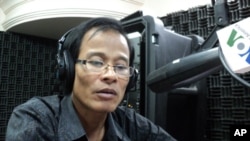A leading union representative says Cambodian workers need help organizing ahead of polls as the country gears up for local elections next year.
Election processes are difficult for factory laborers because of the amount of days and hours they work and the low wages they earn, Chea Mony, president of the Free Trade Union, told “Hello VOA” Thursday.
“We have all obviously seen that workers’ wages are very low…so they need to work overtime to fulfill all the tasks in feeding their lives each month,” he said. Their low earnings plus the high costs of transportation make it hard for them to register and to vote, he said.
“For that reason, the [National Election Committee] should expand and ease mechanisms, set up places for workers to check their names and register to vote at stations near their work, to make it easier for them to exercise their rights as citizens and help them save money,” he said.
The garment industry, one of Cambodia’s key earners, employs more than 300,000 workers, most of them young women from poor, rural communities. The long hours and weeks they work make it hard for them to undertake bureaucratic tasks, such as obtaining official identification cards and many come from villages far distant from the capital or other cities where the jobs are.
Chea Mony said they must be helped if they are to vote “and show their will for which political party they like.”
“If all citizens or workers do not fulfill their duty, that means their exercise of rights is not acceptable,” he said.
It will be up to the National Election Committee or outside organizations to help workers check voter registries and to vote near their workplaces, he said.
“I want [the election committee] to improve the understanding of the workers, and I especially want workers to be able to vote at places near them,” he said, adding that the UN-sponsored elections in 1993 allowed people to vote from wherever they were at the time. Currently, Cambodians must vote near their homes, where they are registered.
Meanwhile, severe flooding across the country during this year’s registration period will likely mean less workers will register or correct their names on registries, Chea Mony said. Many of those who are allowed three days off to register cannot do so, since travel times are slow, requiring up to five days round trip, he said.
Voter registration, which began Sept. 1, will end Oct. 15, with commune elections slated for March 3, 2012. Those will be followed by national elections next year.




